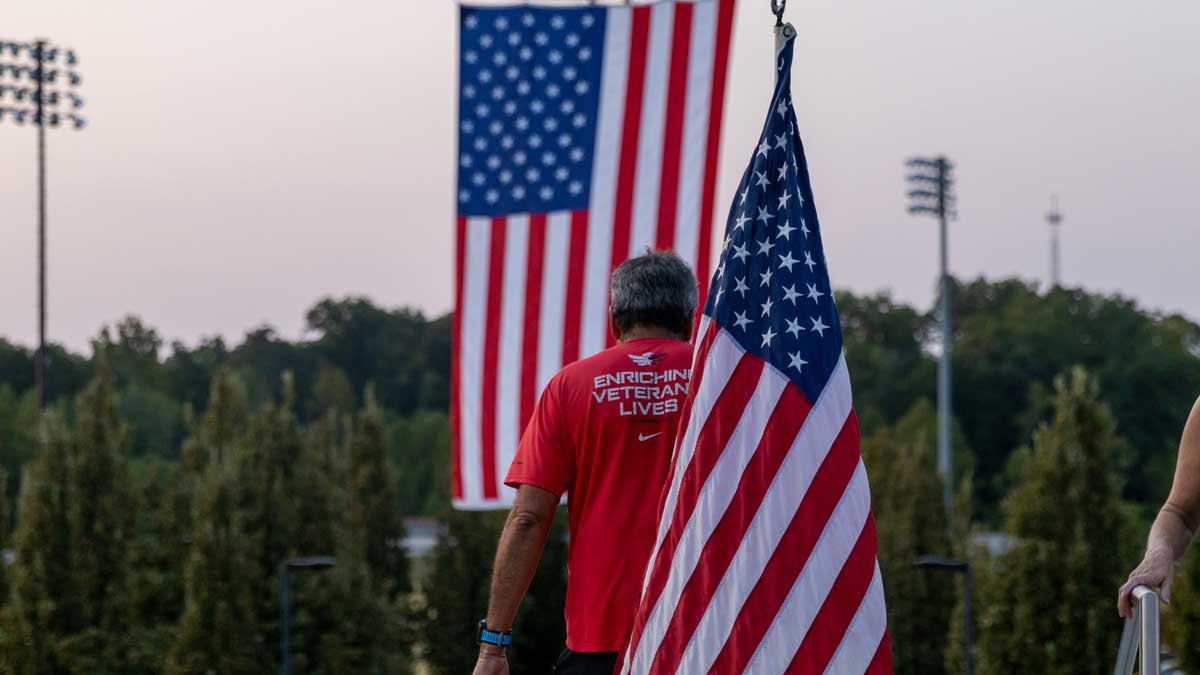
One of the many participants in SIU’s annual 9/11 Saluki Stair Climb at the Banterra Center shows support for veterans. (SIU Carbondale photo)
November 04, 2024
SIU assists rural veterans with transition to civilian life through training, research
CARBONDALE, Ill. – As the country prepares to commemorate Veterans Day on Nov. 11, a Southern Illinois University Carbondale faculty member who is passionate about helping veterans is recruiting rural vets for a study about adjusting to civilian life, and they will be rewarded with an SIU artificial intelligence coding certificate and a little cash.
 Justin McDaniel, associate professor of public health in the School of Human Sciences, is seeking at least 180 veterans over the next two years to participate in the project funded by a $341,600 National Science Foundation (NSF) grant.
Justin McDaniel, associate professor of public health in the School of Human Sciences, is seeking at least 180 veterans over the next two years to participate in the project funded by a $341,600 National Science Foundation (NSF) grant.
“The transition from military to civilian life is challenging, particularly in terms of retooling for a new career,” said McDaniel, who holds joint appointments in the neurology department and the population science and policy department at the SIU School of Medicine. “This transition is often even harder for those who live in rural areas, because access to resources and educational opportunities is more sparce. The focus of this project is helping rural veterans transition from the military into civilian life, college and jobs.”
Media availability
Justin McDaniel, an associate professor of public health at SIU Carbondale who holds joint appointments in the SIU School of Medicine, can be reached at jtmcd@siu.edu to discuss his latest grant project, SIU’s Veteran Education, Transition, Empowerment, Research and Advocacy Network (VETERAN) Lab and veterans issues. McDaniel is also the lead author of “Preventing and Treating the Invisible Wounds of War: Combat Trauma, Moral Injury, and Psychological Health (Ethics, National Security, and the Rule of Law),” a book that highlights moral injury research and advocacy efforts.
Learning, earning and helping others
The project has multiple components, providing veterans with valuable training to boost their careers while also giving McDaniel’s team research data to help other veterans.
Any veteran who lives in a rural area is welcome to participate. The Veteran Education, Transition, Empowerment, Research and Advocacy Network (VETERAN) Lab, directed by McDaniel, is providing the participants with free 17-week, asynchronous online training focused on how to work with code-based artificial intelligence. With the MachinE Learning Training for VETerans (MELT-VETT), participants who may have no experience with public health data learn how to use machine learning, a subdiscipline of AI, to run a basic model. The weekly learning activities take about 30 minutes to finish, and participants will also complete baseline and exit surveys, taking about 20 minutes each.
“These days, AI is basically infiltrating almost every profession,” McDaniel said. “A veteran can get a leg up in their career if they are competent in AI and machine learning. Upon completion of the program, veterans will receive a micro-credential certificate from SIU that can be added to their LinkedIn profile or resume.”
In addition, each veteran will receive a modest cash incentive and be entered into a random drawing for a larger stipend.
The research aspect
McDaniel’s SIU partners for the Rural Veteran Personality, Delay Discounting and the Interference Preservation research project include Yvonne Hunter-Johnson, associate professor and academic adviser for the organizational learning, innovation and development program in the School of Education, and Harvey Henson, director of the STEM Education Research Center and associate professor with joint appointments in curriculum and instruction in the School of Education and geology in the School of Earth Systems and Sustainability.
Team members are exploring several areas, including:
- What psychological issues challenge veterans during their learning experience (these may include moral injury, PTSD, personality type, impulsivity and other issues)?
- How can researchers best tailor educational feedback based on the personality type of veterans and the extent of their impulsiveness?
- What effects can veteran peer mentors/tutors have on the educational outcomes for participants? (An additional $32,654 in NSF funding is covering training for a military veteran doctoral student to provide peer-mentoring.)
Ongoing efforts to benefit vets
In addition, McDaniel has received three consecutive contracts totaling about $181,790 from the U.S. Department of Veterans Affairs to characterize and evaluate a program whose goal is to rehabilitate service members and veterans with traumatic brain injuries via an innovative two-week assessment and treatment program.
McDaniel established the VETERAN Lab to conduct research to benefit members of the military and veterans and to inform evidence-based policy recommendations. Gifts to support the lab can be made through the SIU Foundation. Make a donation or watch a short video about the lab.
